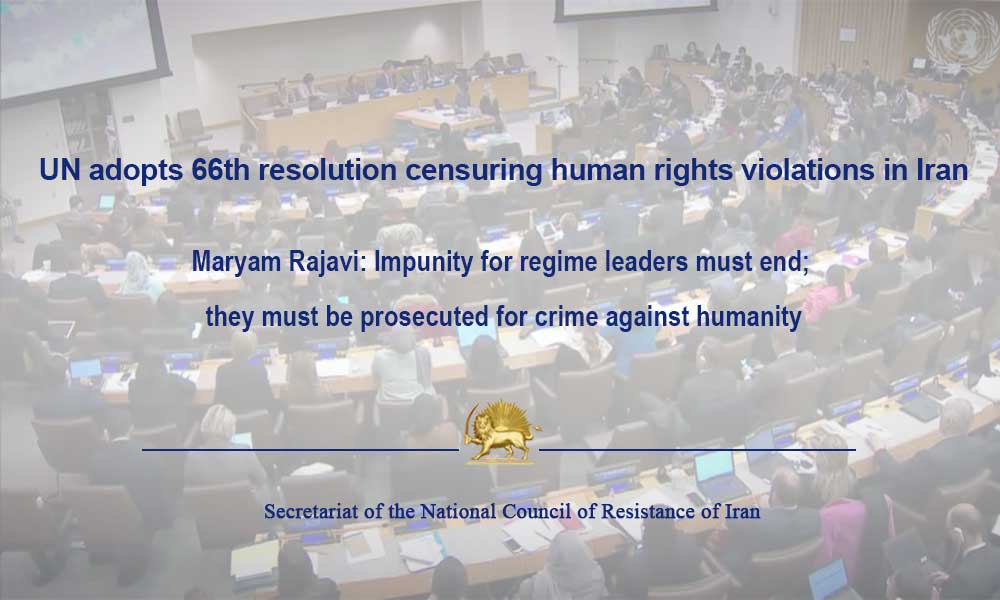UN adopts 66th resolution censuring human rights violations in Iran

Mrs. Maryam Rajavi, the President-elect of the National Council of Resistance of Iran (NCRI), welcomed the adoption of the 66th United Nations resolution condemning the grave and systematic violations of human rights in Iran.
Those responsible for the majority of the crimes to which the resolution has referred are the very people who have been continuously perpetrating crime against humanity for the past four decades, in particular the 1988 massacre of political prisoners, Mrs. Rajavi said, adding, this resolution reaffirms the indisputable imperative that impunity for the criminal leaders of this medieval regime should end and all of them must face justice for 40 years of crime against humanity.
Mrs. Rajavi noted that although this resolution has failed to address many aspects of the flagrant violations of human rights in Iran, including the systematic assassination of dissidents abroad, the crackdown on popular protests, the denial of the Iranian people’s right to participate in their political future, the absence of rule of law, the denial of access to competent courts, and blocking the formation of independent syndicates and unions, it nevertheless makes it palpably clear that the theocracy ruling Iran is the most barbaric and egregious abuser of human rights in the world today. It has flagrantly trampled on the Iranian nation’s fundamental rights in all its political, social and economic aspects, is in no way compatible with the twenty-first century, and must therefore be banished by the world community.
The NCRI’s President-elect underscored that the most glaring and heinous example of the human rights abuses in Iran is the 1988 massacre of 30,000 defenseless political prisoners in which the regime’s former and current have been involved and continue to brazenly defend it. Regrettably, to date, they have been immune from accountability. The UN’s silence and lack of action vis-à-vis this odious crime against humanity is a scar on the conscience of humanity. As such, an investigation into this horrific crime is the litmus test before the international community.
The resolution, adopted with 84 affirmative votes, expresses serious concern “at the alarmingly high frequency of the imposition and carrying-out of the death penalty, [….] in violation of its international obligations, including executions undertaken against persons on the basis of forced confessions or for crimes that do not qualify as the most serious crimes, including crimes that are overly broad or vaguely defined, in violation of the International Covenant on Civil and Political Rights [….] the continued imposition of the death penalty against minors [….] in violation of the Convention on the Rights of the Child.”
The resolution also voices alarm at “the widespread and systematic use of arbitrary arrests and detention [….] the case of suspicious deaths in custody, [….] the poor conditions of prisons, the practice of deliberately denying prisoners access to adequate medical treatment, which creates a
consequent risk of death,” and suppression of “the right to freedom of expression and opinion, including in digital contexts, and the right to freedom of association and peaceful assembly” and “discrimination and other human rights violations against women, including the right to freedom of association and peaceful assembly and the right to freedom of expression and opinion, [….] harassment, intimidation and persecution of political opponents, human rights defenders, women’s and minority rights defenders, labor and trade union activists, students’ rights defenders, environmentalists, academics, film-makers, journalists, bloggers, social media users and social media page administrators, media workers, religious leaders, artists, lawyers, including human rights lawyers, and their families and persons belonging to recognized and unrecognized religious minorities and their families,” [….] and “discrimination and other human rights violations against persons belonging to ethnic, linguistic or other minorities, including but not limited to Arabs, Azeris, Balochis, Kurds and Turkmen, and their defenders.”
Secretariat of the National Council of Resistance of Iran
November 14, 2019
- Tags: Human Rights, Iran

